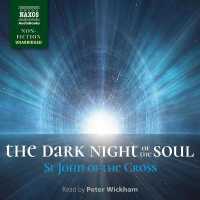- ホーム
- > 洋書
- > 英文書
- > Biography / Autobiography
Full Description
This first-of-its-kind biography tells the story of Rev. James Page, who rose from slavery in the nineteenth century to become a religious and political leader among African Americans as well as an international spokesperson for the cause of racial equality.
Winner of the Rembert Patrick Award by The Florida Historical Society, Florida Non-Fiction Book Award by the Florida Book Awards, Harry T. and Harrietter V. Moore Award by the Florida Historical Society
James Page spent the majority of his life enslaved—during which time he experienced the death of his free father, witnessed his mother and brother being sold on the auction block, and was forcibly moved 700 miles south from Richmond, VA, to Tallahassee, FL, by his enslaver, John Parkhill. Page would go on to become Parkhill's chief aide on his plantation and, unusually, a religious leader who was widely respected by enslaved men and women as well as by white clergy, educators, and politicians. Rare for enslaved people at the time, Page was literate—and left behind ten letters that focused on his philosophy as an enslaved preacher and, later, as a free minister, educator, politician, and social justice advocate.
In Father James Page, Larry Eugene Rivers presents Page as a complex, conflicted man: neither a nonthreatening, accommodationist mouthpiece for white supremacy nor a calculating schemer fomenting rebellion. Rivers emphasizes Page's agency in pursuing a religious vocation, in seeking to exhibit "manliness" in the face of chattel slavery, and in pushing back against the overwhelming power of his enslaver. Post-emancipation, Page continued to preach and to advocate for black self-determination and independence through black land ownership, political participation, and business ownership. The church he founded—Bethel Missionary Baptist Church in Tallahassee—would go on to be a major political force not only during Reconstruction but through today.
Based upon numerous archival sources and personal papers, as well as an in-depth interview of James Page and a reflection on his life by a contemporary, this deeply researched book brings to light a fascinating life filled with contradictions concerning gender, education, and the social interaction between the races. Rivers' biography of Page is an important addition, and corrective, to our understanding of black spirituality and religion, political organizing, and civic engagement.
Contents
List of Illustrations
Acknowledgments
Introduction
1. Early Life in Virginia
2. Forced Migration to the Florida Frontier
3. A New Environment and Responsibilities as an Overseer
4. Challenges, Calamities, and the Ministry
5. Forging Family Ties
6. Intensifying Pastoral Duties and Leadership Responsibilities
7. Stepping toward Civil War
8. The Civil War Years
9. Emancipation and Congressional Reconstruction
10. Radical Reconstruction and Its Aftermath
Epilogue
Notes
Index






